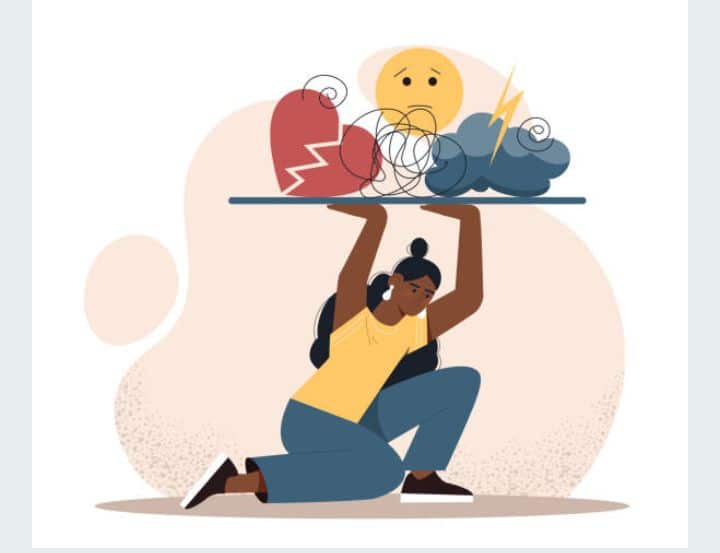Dealing with depression requires a combination of self-awareness, lifestyle changes, and, in many cases, professional support. While everyone’s experience with depression is unique, there are several strategies that can help manage symptoms and improve well-being. Here are some practical steps to help deal with depression:
1. Seek Professional Help (Therapy) Talking to a mental health professional, such as a therapist or counselor, can be one of the most effective ways to manage depression. Cognitive Behavioral Therapy (CBT) is particularly useful for identifying negative thought patterns and learning to challenge and replace them with healthier thoughts. Other therapies, such as interpersonal therapy or psychodynamic therapy, focus on relationships and understanding the root causes of depression.

Medication: In some cases, antidepressant medications may be recommended. These help balance brain chemicals such as serotonin, dopamine, and norepinephrine, which influence mood. Medications like SSRIs (Selective Serotonin Reuptake Inhibitors) or SNRIs (Serotonin-Norepinephrine Reuptake Inhibitors) are commonly prescribed. It’s essential to consult a healthcare provider for a proper diagnosis and medication plan tailored to your needs.
2. Establish a Routine: Depression can make even simple tasks feel overwhelming, and many people experience a lack of motivation. Establishing a routine helps by providing structure and a sense of purpose. Start Small , Set small, achievable goals, such as getting out of bed, showering, or preparing a meal daily Structure.
Try to plan your day, including work, relaxation, and self-care activities. Having a predictable routine helps reduce stress and makes it easier to manage depressive symptoms.

Consistency: Sticking to regular sleeping and eating schedules can help regulate mood and energy levels.
3. Exercise Regularly: Physical activity is a powerful tool for managing depression. Exercise releases endorphins, which improve mood and reduce stress, it Start Slowly If you haven’t been active, begin with simple activities like walking or stretching. Even 10-15 minutes of exercise a day can make a significant difference.
Find an Enjoyable Activity: Whether it’s yoga, dancing, running, or swimming, choose an activity you enjoy so it feels less like a chore and more like a reward.
Commit to Regular Exercise: Aim for moderate physical activity for at least 30 minutes, three to five times a week. This can help manage depressive symptoms over time.
4. Eat a Balanced Diet: Nutrition plays a critical role in mental health. While depression can sometimes lead to poor eating habits, being mindful of what you eat can positively affect your mood. Include Omega-3 Fatty Acids Found in fish like salmon and sardines, omega-3 fatty acids support brain health and may help reduce symptoms of depression.
Eat a Variety of Nutrient-Rich Foods: Incorporate fruits, vegetables, whole grains, and lean proteins to give your body the nutrients it needs to function optimally. Stay Hydrated that is Dehydration can worsen fatigue and irritability, so make sure you’re drinking enough water throughout the day.
5. Practice Mindfulness and Meditation: Mindfulness practices, such as meditation, can help reduce the negative thoughts often associated with depression. Mindfulness encourages being present in the moment without judgment, helping individuals avoid dwelling on past regrets or future anxieties.
Mindful Breathing: Practice focusing on your breath for a few minutes each day. This simple act can help calm the mind and reduce stress.
Meditation Apps: Many apps provide guided meditation specifically designed to manage depression and anxiety. Regular meditation has been shown to reduce depressive symptoms and improve overall emotional regulation.
6. Build a Support System Having a support system is essential for dealing with depression. It can be helpful to talk to friends or family members who are supportive and understanding..
Stay Connected: While it might feel easier to withdraw, isolation can worsen depression. Stay in touch with people who make you feel safe and valued.Join Support Group : Many communities and online platforms offer support groups for individuals dealing with depression. These spaces can provide a sense of belonging and the opportunity to share experiences with others going through similar struggles.

7. Get Enough Sleep: Depression often disrupts sleep patterns, leading to insomnia or oversleeping. Restful sleep is crucial for emotional and physical well-being.Establish a Sleep Routine : Go to bed and wake up at the same time every day, even on weekends. Consistent sleep patterns help regulate mood.
Create a Relaxing Environment: Make your bedroom conducive to sleep by minimizing noise and light, and consider limiting screen time before bed. Practice Sleep Hygiene : Avoid caffeine or heavy meals close to bedtime, and engage in relaxing activities, like reading or taking a warm bath, to signal your body that it’s time to rest.
8. Avoid Alcohol and Drugs: Many people with depression may turn to alcohol or drugs as a way to cope with their feelings. However, these substances can worsen depression in the long run by disrupting sleep, impairing decision-making, and increasing feelings of hopelessness.
Limit Alcohol Consumption: Alcohol is a depressant, and while it may provide temporary relief, it can make depressive symptoms worse over time.- Seek Help if Necessary : If substance use has become a way to manage depression, professional help may be needed to break the cycle and address the underlying issues.
9. Challenge Negative Thoughts: Depression often distorts thinking, leading to overly negative and critical thoughts about oneself, the future, and the world.Cognitive Behavioral Techniques , CBT can help individuals recognize and challenge these distorted thoughts. For example, replacing “I’ll never feel better” with “I’ve had better days in the past, and I can have them again” helps shift toward more balanced thinking. Journaling : Writing down your thoughts can help you identify negative patterns and see them more objectively. Journaling can also serve as an outlet for emotions.
10.Engage in Activities You Enjoy: Depression can take away interest in activities that once brought joy. However, engaging in these activities—even when you don’t feel like it—can help lift your mood over time.
Schedule Pleasant Activities: Try to include things you used to enjoy in your daily or weekly schedule. Whether it’s a hobby, reading, or spending time with loved ones, these activities can provide a sense of accomplishment and joy and be Patient with Yourself. It’s normal not to feel instant gratification from activities at first. Give yourself time, and recognize that small steps can still be progress.
Dealing with depression is not easy, but it is possible with the right combination of treatment, self-care, and support. By seeking professional help, establishing healthy routines, staying connected with loved ones, and taking small steps toward self-care, individuals can learn to manage their symptoms and work toward recovery. Patience and persistence are key, as healing from depression takes time. However, with the right strategies in place, it’s possible to regain a sense of well-being and lead a fulfilling life.




